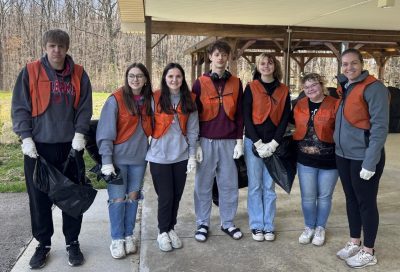On any given day, there are multiple patients who visit the UPMC Northwest Emergency Department and Behavioral Health Unit. Their reasons for being treated in these units range from experiencing routine symptoms to more severe illness or injury.
The Emergency Department staff began noticing with increased regularity that patients needed a change of clothes to return home, a situation that the patient or their family were not prepared for in many instances.
Whether patients are victims of sexual assault or have been in automobile or other traumatic accidents, the need to remove the patient’s clothing, sometimes ruining them in the process, is necessary to properly treat the patient.
In addition, a number of patients present to the ED and Behavioral Health units who do not have the means to adequately clothe themselves.
Heidi Boitnott, unit director of the Emergency Department, and Trisha Rimpa, clinical administrator of the Behavioral Health Unit, knew that they were experiencing the same issues with regard to patients needing clothing.
According to Rimpa, “There has always been a need for extra clothing on the Behavioral Health Unit. Many of the BH patients do not know they will be admitted or even coming to the hospital due to involuntary admission status and crisis situations.”
“Patients are often admitted with only whatever they are wearing, which most times does not include shoes, coats, or appropriate undergarments. Due to the circumstances of the patient’s arrival, there are typically other stressors going on that do not allow for items to be brought in for the patient,” she adds.
“They may not have supportive family or friends or have travelled a long distance to be admitted to Northwest. We receive referrals and patients from all over the state due to the lack of behavioral health beds throughout the country.”
Following much discussion by the unit directors and their staffs, the idea to develop a more efficient system to supply clothing to patients in crisis was formed. On many occasions, staff from Behavioral Health have purchased items on their own or made quick trips to area stores to pick things up for patients, or even shared some personal items with patients in need.
With the assistance from all 15 members of the Northwest Hospital Foundation Board, a solution for this issue was found.
Because the patients, both male and female, who require these items can be any age and size, a wide variety of items could be needed on any given day. Storage of these clothes and having the right item at the right time for the right patient became a real issue.
“We realized early on that because of the wide variety of clothing and shoe types, styles and sizes needed vary on an individual basis, and keeping that kind of stock was unrealistic with our limited storage space, a gift card system would be a better solution all around,” said Boitnott.
That’s where the Northwest Hospital Foundation board came in. The two directors approached the foundation to provide ‘seed money’ for the Clothing Fund, and the board members very generously jumped on board.
“As a board, we recognized the direct human impact of this project, and wanted to become personally involved to maintain the dignity of patients,” said Theresa Edder, foundation executive director.
“The board recognized that it is not a good idea for patients to leave the hospital with inadequate clothing or in a hospital gown, especially in the winter months, and everyone committed to contributing our annual gift in support of this important project,” she continued.
The Clothing Fund has been established with over $5,300 and enables staff members to provide Walmart gift cards in $10 increments to patients and/or their families to purchase clothing for the trip home or transfer to another facility. If no family member is available to purchase the clothing items, hospital staff will do the shopping.
“The initiation of the Clothing Fund is such a blessing because then staff are able to provide these basic needs for patients without always sacrificing their own money. If you have never dealt one-on-one with a patient who is about to be sent to another facility or treatment center, and they have no underwear of their own or no coat, it is hard to describe,” said Rimpa.
“The patients are so thankful and grateful for any help that we provide them, and due to circumstances of their illness they have lost many personal belongings, and clothing is often one of the first to go. A warm coat and shoes without holes often brings tears to the eyes of the patient and the staff who make it happen,” she adds.
And according to Boitnott, “One of our main purposes is to protect our patients’ dignity while they are in our care, and this is one small way that we are able to do that,” added Boitnott. “We are fortunate to have Northwest Hospital Foundation to assist us in providing high quality, compassionate care for all of our patients.”



